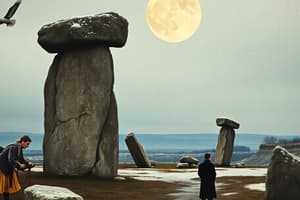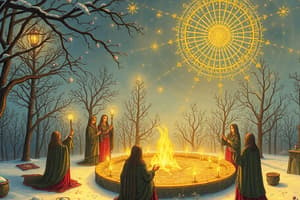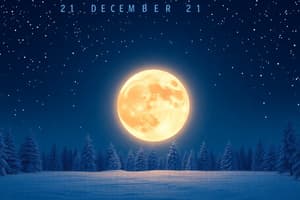Podcast
Questions and Answers
What astronomical event marks the start of winter in the Northern Hemisphere?
What astronomical event marks the start of winter in the Northern Hemisphere?
- Spring equinox
- Winter solstice (correct)
- Summer solstice
- Autumn equinox
How does Earth's tilt affect the seasons?
How does Earth's tilt affect the seasons?
- It influences the orbit of the Moon around the Earth.
- It has no effect on the changing seasons.
- It causes variations in temperature only during the spring.
- It affects how much sunlight different hemispheres receive. (correct)
What is notable about Stonehenge in relation to the solstice?
What is notable about Stonehenge in relation to the solstice?
- It was built during the summer solstice.
- It has no known connection to solstice ceremonies.
- It is the largest structure dedicated to winter celebrations.
- It aligns with the Sun's movement during solstices. (correct)
During the winter solstice, which hemisphere is tilted away from the Sun?
During the winter solstice, which hemisphere is tilted away from the Sun?
What happens at Newgrange during the winter solstice?
What happens at Newgrange during the winter solstice?
Which winter tradition occurs in San Francisco during the winter solstice?
Which winter tradition occurs in San Francisco during the winter solstice?
In what way do residents of Anchorage, Alaska, celebrate the long winter nights?
In what way do residents of Anchorage, Alaska, celebrate the long winter nights?
What significance did ancient cultures associate with the winter solstice?
What significance did ancient cultures associate with the winter solstice?
Flashcards
Winter Solstice
Winter Solstice
The shortest day of the year in the Northern Hemisphere, occurring on December 21st.
Summer Solstice
Summer Solstice
The longest day of the year in the Southern Hemisphere, occurring on December 21st.
Earth's Tilt and Seasons
Earth's Tilt and Seasons
The tilt of Earth's axis at a 23.5-degree angle causes different parts of the Earth to receive varying amounts of sunlight throughout the year.
Stonehenge
Stonehenge
Signup and view all the flashcards
Newgrange
Newgrange
Signup and view all the flashcards
Yule
Yule
Signup and view all the flashcards
San Francisco Winter Solstice Bonfire
San Francisco Winter Solstice Bonfire
Signup and view all the flashcards
Anchorage Winter Solstice Activities
Anchorage Winter Solstice Activities
Signup and view all the flashcards
Study Notes
Winter Solstice
- December 21, 2024 is the winter solstice in the Northern Hemisphere
- This marks the shortest day and longest night of the year in the Northern Hemisphere
- The Southern Hemisphere experiences the summer solstice on the same day, with the longest day and shortest night
- Earth's tilt (23.5 degrees) and orbit around the Sun cause seasons
- During the solstice, the Northern Hemisphere is tilted furthest from the sun, receiving less sunlight
- The Southern Hemisphere tilts towards the sun, experiencing more sunlight
Significance in Ancient Cultures
- Winter solstice was significant to ancient cultures, symbolizing the Sun's rebirth
- Rituals marked the event
- Stonehenge, Wiltshire, England was likely built for solstice ceremonies, aligning with the Sun's movement
- Newgrange, Boyne Valley, Ireland, allows a beam of light into a chamber during sunrise around the winter solstice
Modern Celebrations
- Several US cities have solstice traditions
- San Francisco, California holds a bonfire on Ocean Beach
- Anchorage, Alaska has activities like sleigh riding, ice lantern paths, and northern lights viewing
- Limited entry to Newgrange's chamber for visitors, due to high demand
Studying That Suits You
Use AI to generate personalized quizzes and flashcards to suit your learning preferences.





